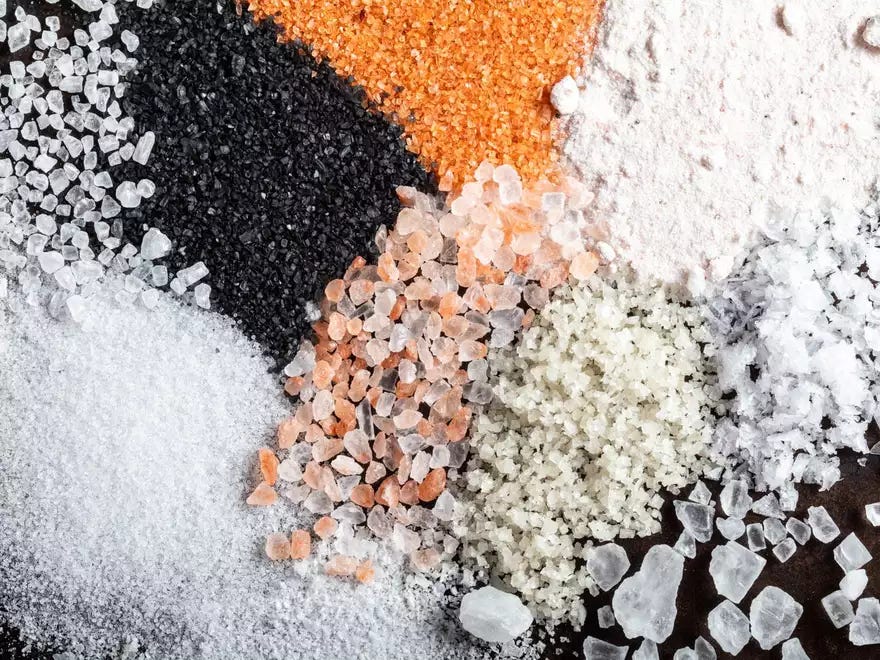You never notice the presence of salt in your food but its absence you can immediately feel; such is the indispensable nature of what is undoubtedly the most famous seasoning in the world. It is an alchemist agent; doesn’t add much flavor on its own but rather brings forth all the flavors that are present within the food itself.
There is a reason that the word ‘salvation’, which means to save, preserve or redeem comes from the word ‘salt’. Salt is life. Salt salvages not only cooked dishes but life itself. It is not for nothing that it competed with gold ounce-for-ounce at a point in time, truly making it “worth its weight in gold.”
Thanks for reading Rumblings! Subscribe for free to receive new posts and support my work.
Salt is life
Every single cell in your body requires salt to function. Every cell contains salt in an ionized form.
Hydration is not as much about water as it is about salt. Salt is what balances fluids in the blood and stabilizes blood pressure. Salt is what creates electricity in your body allowing for the nerves to fire, muscles to function and nutrients to be converted into energy. There is no living without salt; hyponatremia (low sodium levels in the blood) can take your life.
A lot to learn about this tiny seasoning
Although most of the developed world continues to wage a war against salt consumption, blaming it for everything from high blood pressure to heart disease, there is little merit behind many of its stated evils. Not that there are none but balanced consumption does no harm, as with everything in life.
Excessive and sudden salt intake does make you dehydrated and as thirsty as a raver in a desert but the chronic and gradual increase has mirror effects. It can actually lead to an impaired thirst mechanism causing you to drink less water in the long run.
That temporary thirst you experience after wolfing down a bucket of fries gets blunted over time. Not only that but salting your tongue can also lead to increased hunger and weight gain. Whether that’s a good or a bad thing depends on which side of the weighing scale you want to be at.
Salt also has some remarkable effects on your brain both before and after you are born. Salt is theorized to potentially increase or at least maintain the IQ of children. The theory goes that iodine deficiency is rampant in pregnant women which affects the developing brain of a child. Iodine is critical for thyroid and cerebral functioning. Lowered salt intake can lead to an IQ reduction of 10 - 15 points in children.
Perhaps the most remarkable benefit of salt is its potential (pun intended) as a powerful anti-anxiety condiment. Low sodium levels increase anxiety in rats and cause reduced interest and participation in the activity. Low salt was found to be highly anxiogenic (anxiety-inducing) but did not affect existing mental health conditions.
This is no reason for you to be reaching out for that salt shaker every time you feel a bit panicky though because, if you are like most people, you are already getting more than enough.
Neither too less nor too much, just enough
The recommended dose of sodium (the principal element we need from salt) is 1.5 to 2.3 g per person. That works out to just under a teaspoon of salt per day. We are all, most of us anyway, consuming a lot more than that, at least three times that amount.
Still, it makes little sense to go by the recommendations. If there is one thing that applies to everyone when it comes to dietary recommendations is that nothing applies to everyone. The recommendations can serve as benchmarks or guidelines while you figure out what works best for you.
Salt plays a critical role in nearly every function in the body and thus the level of salt you need depends on myriad life factors such as level of mental and physical activity, anxiety levels, inflammation within the body, and many more. We would probably need a quantum computer hard at work to spit out a universal formula that could take all of it into account and apply to all salt guzzlers out there.
Science does not know it all, not yet anyway
Electrolyte tests are the gold standard when it comes to salt (and other electrolytes) imbalances within the body. The trouble with these tests is that they measure imbalances only within the blood and extend those results to the rest of the body.
While “blood is the body’s truth”, to quote Dexter Morgan, it is only half the truth; the body is more than the blood flowing within it. These tests do not reveal imbalances within your cells, bones, muscles, organs, and anywhere else that salt decides to make its home (which is practically everywhere within the body).
Imbalances at these levels are not detected in these tests. Imbalances at these levels do not change fast enough. Imbalances at these levels require sustained and corrective action. Scientific tests for sodium imbalances are, unfortunately enough, not worth their salt (could not let this one pass).
A balancing act
Saline equilibrium is a monstrous balancing act, something akin to the guy up there. You can never get it absolutely right but you can get close and trust your body to do the rest. That is how health works anyway; you meet your mind and body halfway and trust it to take care of the rest.
I am going to lay down some suggestions, ironically enough, that I have come to realize about all things salt. Follow what works for you, ignore what doesn’t but read up on all of them
More is better than less
Your body can compensate (within limits) for higher intake but definitely has no workaround for lower consumption. Given the critical nature of this seasoning, it is better to consume more than less, for once.Be in control
The easiest way to regulate and control your dietary intake is to cut out all processed and packaged foods. These “foods” are loaded with all sorts of flavor modifiers that mask the actual content of salt in the food and hinder the intelligence of your body to determine the saline level in the food. This brings me to…Trust thy mind-body
There is a reason why you might prefer to go easy on the salt while your partner prefers to layer it with some of the salty goodness. Each of us craves salt differently because each of us is built differently.
Trust your body and mind to guide you towards optimal salt consumption. Do what feels right and not what feels good. The first one is instinct, the other a conditioned reaction.Hydrate enough but not too much
The primary goal of sodium, over and above all else, is to regulate fluid levels within the body. Sodium and water are as intimately linked in the body as the sun and light or darkness and night. Balance out salt by balancing out the fluid intake.A pinch at a time
If you are considering tinkering with your salt intake, do it gradually and allow your body time to adapt. Your body is just like you, it detests sudden change. And just like you, it will throw tantrums and it will react if you change too much too fast. Nausea, stomach cramps, weakness, fatigue, and spasms are some of the tools in its arsenal.
Notice and appreciate the subtle changes in your perception, taste, and sensitivity to salt as you up or lower your intake. Adapt your intake by listening to your mind but following your body.
With a grain of salt
At the end of it all, I would urge you to understand your body and do what feels right, not what feels best. I would implore you to follow your instincts and trust your body-mind. I would advise you to take not only this article but everything else you read on the internet (especially about diet) with a grain of salt. And while you are at, do the same with your morning water or mid-afternoon ants on a log.
P.S. Don’t be overwhelmed by the purported benefits of one salt over another; they are nearly identical on a molecular level. Choose what appeals to your eyes and delights your tongue.



